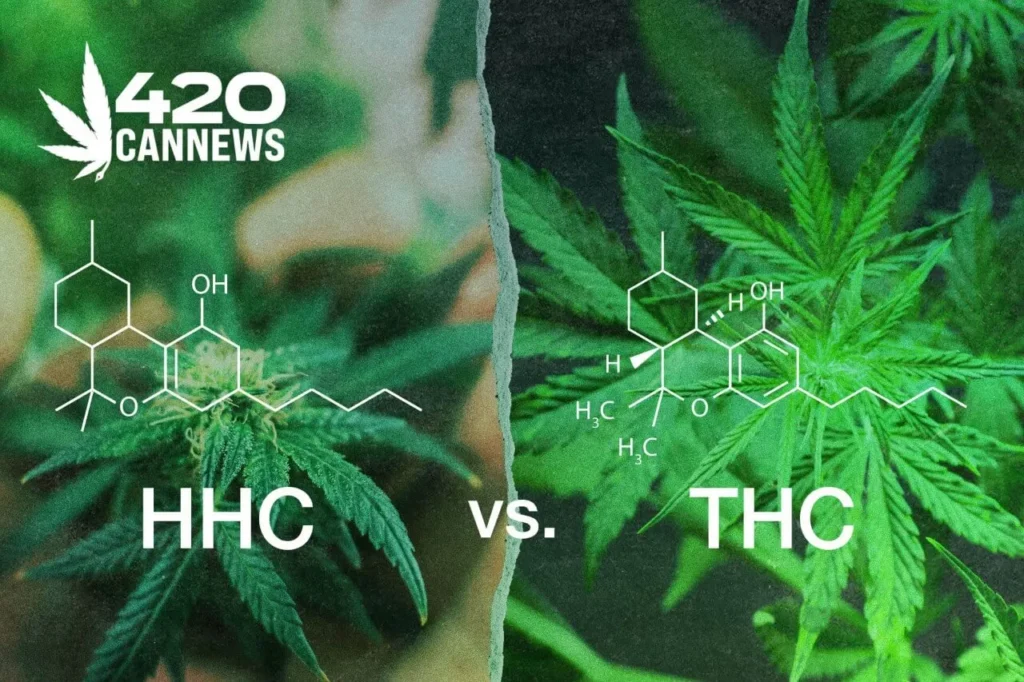In the realm of cannabis, THC has long reigned supreme as the most well-known psychoactive compound. However, a new challenger has emerged: hexahydrocannabinol, or HHC—a cannabinoid gaining attention for its unique effects and legal status. As cannabis enthusiasts and medical patients alike seek alternative cannabinoids, understanding the differences between HHC and THC is crucial.
In this article, we will shed light on these two cannabinoids, comparing their properties, effects, and legal statuses.
Key Takeaways
| Aspect | HHC | THC |
| Psychoactive Effects | Mild, comparable to Delta-8 THC | Strong, the primary psychoactive component in cannabis |
| Legality | Legal gray area, varies by region | Federally illegal in many countries, legality varies by state in the U.S. |
| Availability | Emerging in markets, found in vape cartridges, edibles, etc. | Widely available in regions where cannabis is legal |
| Dosage and Consumption | Lower potency requires higher doses for effect | Potent, effects achievable with lower doses |
| Potential Benefits | Anecdotal evidence suggests pain relief and relaxation | Well-documented therapeutic benefits including pain relief, nausea reduction |
| Risks and Safety | Lack of comprehensive research, concerns over production safety | Potential for dependency, psychoactive side effects |
What is HHC?
HHC stands as a testament to the ingenuity of cannabinoid science. Originally discovered in the pursuit of understanding cannabis’s pharmacological effects, HHC is a hydrogenated form of THC. This process not only enhances its stability but also introduces a legal loophole that makes HHC more accessible in certain jurisdictions.
Production Process of HHC
The journey of HHC begins with cannabidiol (CBD) extracted from hemp. Through a sophisticated chemical process, CBD is transformed into HHC, resulting in a compound that shares a familial resemblance to THC but with its own distinct characteristics. This hydrogenation process not only alters HHC’s chemical stability but also its affinity for the body’s cannabinoid receptors.
What is THC?
THC, or Tetrahydrocannabinol, is the star of the cannabis show. It’s the main psychoactive ingredient that gives marijuana its renown. Present in various strains, THC’s effects are as diverse as the plant itself, ranging from euphoria and relaxation to enhanced sensory perception.
Types of THC
- Delta-9 THC: The most abundant form in cannabis, responsible for the classic high.
- Delta-8 THC: A milder cousin of Delta-9, offering a less intense experience.
HHC vs. THC: Key Differences
The comparison between HHC and THC unfolds across several dimensions:
- Psychoactive Effects: HHC offers a gentler high compared to THC, making it suitable for those seeking milder effects.
- Legality: HHC operates in a legal gray area, with its status more ambiguous than the strictly regulated THC.
- Availability: While THC products are commonplace in areas with legal cannabis, HHC is slowly making its way into consumer consciousness.
- Dosage: Due to its lower potency, HHC often requires higher doses to achieve desired effects, contrasting with THC’s more potent nature.
Choosing Between HHC and THC
When deciding between HHC and THC, consider the following:
- Desired Effects: If you’re seeking a milder, more controlled experience, HHC might be your preference. For a more potent psychoactive effect, THC is the go-to.
- Legal Restrictions: Check your local laws to understand the legality of HHC and THC in your area. HHC might offer a legal alternative where THC is restricted.
- Individual Preferences and Needs: Consider your personal tolerance and medical needs. HHC’s less potent effects might benefit those sensitive to THC’s intensity.
- Consultation with Healthcare Professionals: Always seek advice from a healthcare provider, especially if you’re considering cannabinoids for therapeutic purposes.
Legality and Safety of HHC vs. THC
The legal status of HHC and THC varies significantly around the world. While THC is widely recognized and regulated, HHC’s legal standing remains ambiguous, creating challenges for consumers and businesses alike. Safety concerns also emerge, particularly with HHC, due to the lack of comprehensive research and standardization in its production.
The Future of Cannabinoids
As research continues and legalization movements gain momentum, the future for cannabinoids like HHC and THC is bright. Innovations in cannabinoid science may lead to new therapeutic applications and safer consumption methods. However, the path forward requires careful regulation, research, and education to ensure consumer safety and informed choices.
Conclusion
HHC and THC offer intriguing possibilities for both recreational and medicinal users, each with its unique profile of effects, legal considerations, and safety profiles. As the cannabis landscape evolves, staying informed and cautious is key. At 420CanNews, we’re dedicated to bringing you the latest and most accurate information on cannabis developments, helping you navigate this exciting field with confidence.
FAQ
What is HHC?
HHC, or Hexahydrocannabinol, is a hydrogenated form of THC found in the cannabis plant. It’s known for its stability and mild psychoactive effects.
What is THC?
THC, or Tetrahydrocannabinol, is the primary psychoactive compound in cannabis that produces the “high” sensation.
How do HHC and THC differ in effects?
HHC offers a milder high compared to THC. While THC is known for its potent psychoactive effects, HHC provides a gentler experience.
Is HHC legal?
HHC exists in a legal gray area. Its legality varies by region, depending on local laws regarding hemp-derived compounds.
Can HHC get you high?
Yes, HHC can get you high, but its effects are generally considered to be milder than THC.
Does HHC have any medical benefits?
Current evidence on HHC’s medical benefits is mostly anecdotal. More research is needed to understand its therapeutic potential fully.
Are there any safety concerns with HHC?
Due to the lack of comprehensive research, the safety profile of HHC is not well-established. Consumers should proceed with caution and seek products tested for purity and safety.


